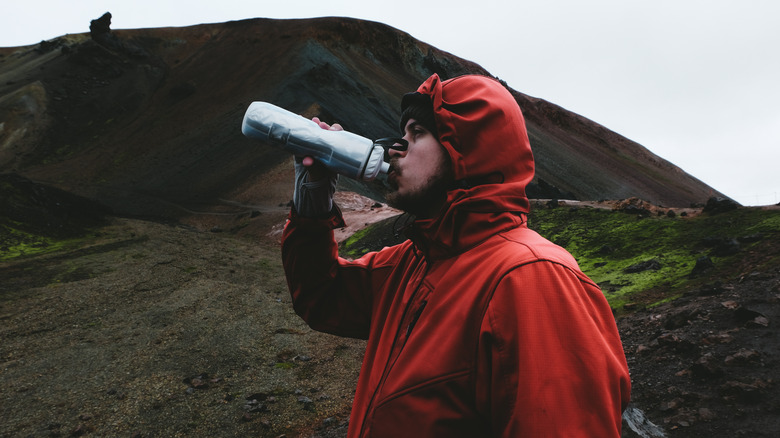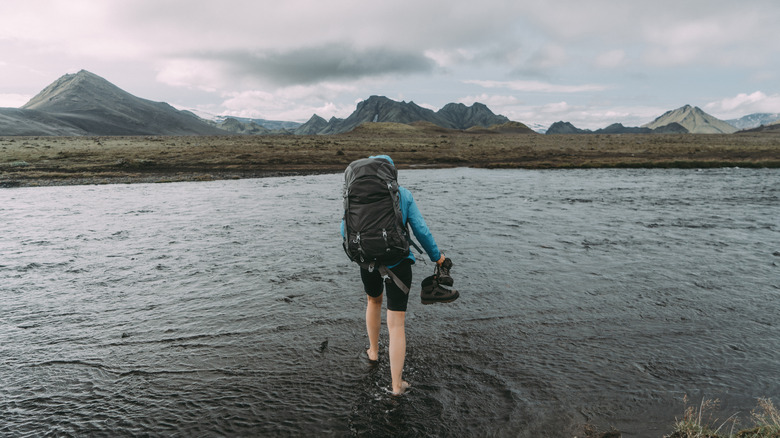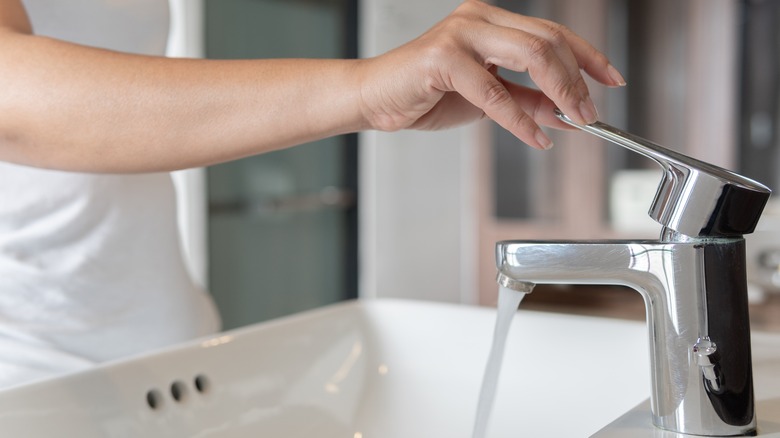Why Tourists Should Avoid Drinking Bottled Water While In Iceland
As a tourist, the easiest way to stay hydrated on the go is by grabbing a bottle of water from a supermarket or another shop. However, you'll want to rethink the packaged water sold in stores when visiting Iceland. According to many visitors — and some proud locals — the country's tap water is the best way to stay hydrated.
In a TikTok clip posted by Iceland resident @kyanasue, the content creator can be seen taking a sip of water straight from a glacier. "This fresh filtered glacier water goes straight to every tap in Iceland and fills all the bottled water you drink." In other words, the same great-tasting water found in a bottle is available for free right at the sink.
@kyanasue BEST WATER IN THE WORLD!! 🥶🥶 Truly the freshest and coldest water you can find in the world. Icelandic water will ruin all other water for you. It's something I miss the most when I go abroad. This fresh filtered glacier water goes straight to every tap in Iceland and fill all the bottled water you drink. Do yourself and the environment a favor by filling up reusable water bottles anywhere in the country instead of buying bottled water at the store. It's the same water anyway 😅 The water is so fresh and travels so little distance that it doesn't have time to pick up all the minerals and things, giving it the fresh and crisp taste you've always dreamed your water to have. It's the water you didn't know you needed. For over 300 more incredible locations, stays, restaurants, and tours check out my Iceland Guide found at the link in my bio. I've done all the research in Iceland so you don't have to. Pick your favorite things on my map and create your itinerary today. You can also book a call or order a personalized itinerary there. I'm happy to make your dream Iceland trip come true #iceland #bucketlist #icelandadventures
Besides its pure flavor, Icelandic tap water is clean and safe to drink. The European country's H2O received a score of 95.2 out of 100 for sanitation in Yale's Environmental Performance Index. It's naturally purified through lava and contains no chlorine, calcium, or nitrate. On top of that, ditching the plastic bottles and sticking to water from the tap is a better choice for the environment — win-win!
Be sure to bring a reusable water bottle
When you're in a pinch and need to rehydrate, bottled water can be a lifesaver. However, a better swap when in Iceland is your own reusable bottle. Pack a reusable water bottle from home — you'll want to make sure to drink lots of water while flying anyway — and keep it in your day bag while exploring Iceland's popular hiking trails and other stunning natural destinations. Then, top up as you go.
If you're in the capital city of Reykjavík, you'll find refilling stations placed in various spots along the streets and on the sidewalks. You can also fill your bottle at your hotel, restaurants, or public restrooms. If you're outside the city, you can get safe drinking water right at the source. Rivers and glacier streams often supply potable water that needs no filtering. However, it's best to do a little research or ask a guide to be sure the water found during your adventures is okay for consumption.
Don't mind the smell
If you've never been to Iceland, you might be surprised that the country's natural water has a pungent smell. This is true at the Blue Lagoon, Iceland's most popular tourist destination, and it's also true of the water coming out of the faucet. When you take a shower or turn on the warm tap to wash your face in the morning, you might just get a whiff of sulfur.
However, don't let the stench turn you off from drinking from the tap. Simply switch your faucet from hot to cold, and after letting the cold water run for a few seconds, you'll notice the rotten egg smell disappear. This is because Iceland's tap water comes from two different sources, depending on the temperature. Warm water comes straight from geothermal power plants, similar to the country's famous bathing waters, while cool water comes from the local springs.
Water research scientist Dr. Arna Pálsdóttir explained to The Reykjavík Grapevine, "The hot water smells of rotten eggs because it contains hydrogen sulphide. There are basically two hot water systems in [Reykjavík], one of which gets hot water directly from geothermal wells within the city limits. The water in those wells naturally contains hydrogen sulphide, but not in dangerous levels of concentration." The hot tap water is generally safe to drink, but if the smell makes your stomach churn, stick to cold H2O instead.


